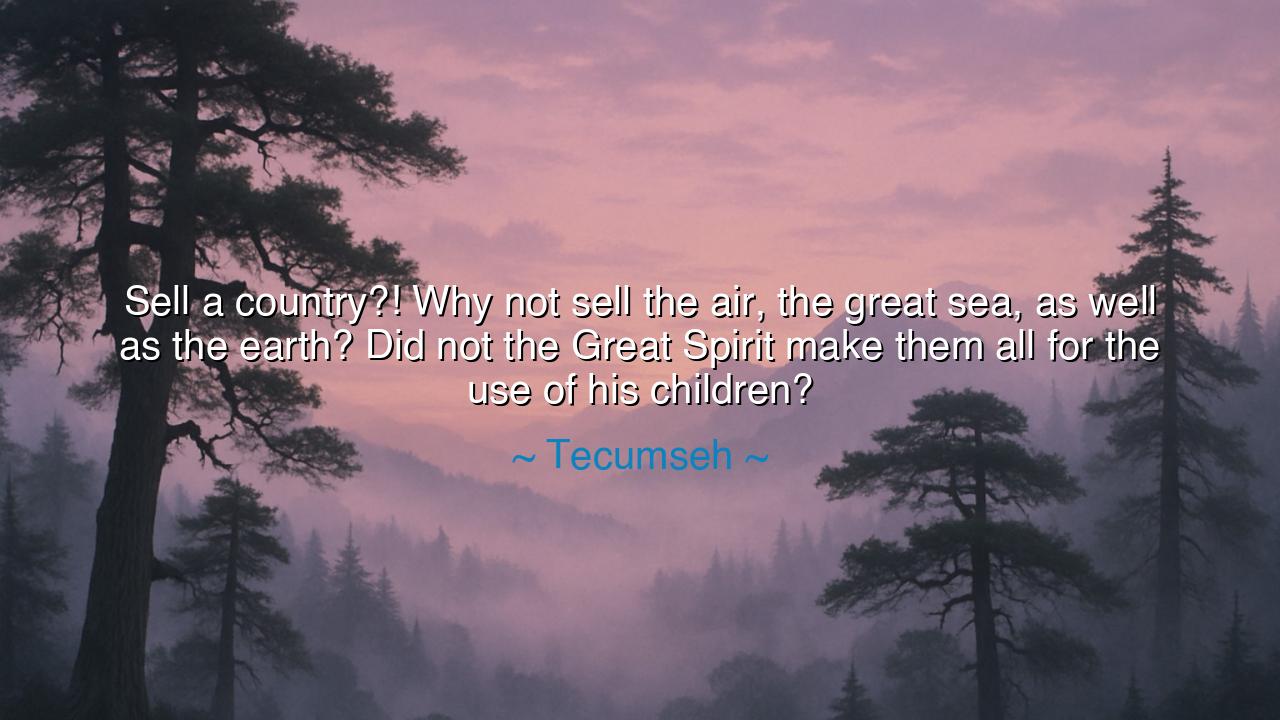
Sell a country?! Why not sell the air, the great sea, as well as
Sell a country?! Why not sell the air, the great sea, as well as the earth? Did not the Great Spirit make them all for the use of his children?






When the great Shawnee leader Tecumseh cried out, “Sell a country?! Why not sell the air, the great sea, as well as the earth? Did not the Great Spirit make them all for the use of his children?” he was not merely protesting the theft of land — he was proclaiming a truth eternal and sacred: that the earth does not belong to man; man belongs to the earth. His words were not those of anger alone, but of reverence — a voice that rose like thunder from the heart of a people who understood that all life is bound in one sacred circle.
Tecumseh spoke in an age when the lands of his ancestors were being carved, sold, and stolen by those who saw the earth not as mother, but as possession. To the newcomers, the land was property — something to be traded, fenced, and owned. But to Tecumseh and his people, it was spirit, alive with memory and meaning. Every river held a story, every mountain a guardian. How, he asked, could any man sell the sky, or the wind that cools his brow, or the sea that feeds his children? In that question burned both the sorrow and the wisdom of his people — a truth that modern man still struggles to learn.
The origin of his words lies in the long conflict between Native nations and the expanding settlers of the early 19th century. Tecumseh, warrior and visionary, sought to unite all tribes into a single confederation, so they might stand together to protect their shared homeland. He saw clearly that division meant defeat, and that the destruction of their lands would bring the destruction of their spirit. When the Americans offered gold and treaties in exchange for territory, Tecumseh refused, declaring that no one had the right to sell what the Great Spirit had given to all. “The land,” he said, “is like the air — it cannot be sold.” Thus spoke a man whose wisdom transcended his time, a prophet of balance and stewardship.
Consider, for a moment, the story of his stand. In the year 1811, when the treaties were being signed and the forests trembled under the advance of settlers, Tecumseh traveled across vast distances — from the Great Lakes to the Gulf of Mexico — urging unity among the tribes. He spoke not of hatred, but of harmony, of returning to the ways of respect. Yet when he saw that words alone could not stop the tide, he took up arms, not for conquest, but for preservation — to defend the sacred bond between his people and their land. Though he fell in battle in 1813, his words outlived his body, echoing still as the cry of the earth herself.
What Tecumseh taught is a lesson the world has nearly forgotten: that greed blinds the spirit and breaks the covenant between humankind and creation. To sell the land is to sell one’s own mother, to take what was never meant to be owned. The earth gives us breath, food, shelter, and beauty — yet we scar her for profit, we divide her for power. His words rise again in our time, a warning carried by the wind: if we treat the world as property, soon there will be nothing left to inherit but ashes. The Great Spirit’s gift is not to be conquered, but to be cared for.
Let us then draw wisdom from Tecumseh’s fire. Honor the earth as you would your own mother. Walk gently upon her skin; take only what you need, and give thanks for what you receive. Defend her rivers from poison, her forests from greed, her creatures from cruelty. Teach your children that wealth is not measured in gold or land, but in the harmony of life that surrounds them. For every act of reverence restores the sacred circle that Tecumseh sought to protect.
The lesson, simple yet profound, is this: the world cannot be sold, for it was never ours to sell. We are but caretakers passing through, entrusted with the guardianship of what the Great Spirit made. To forget this is to lose our soul; to remember it is to live once more in balance with all that is. Let Tecumseh’s words be a torch for the generations — a call to return to reverence, to humility, to the eternal truth that the air, the sea, and the earth belong not to the few, but to all the children of creation.
And when the day comes that you stand before the beauty of a mountain, or the vastness of the ocean, whisper his question to the wind: “Sell a country? Why not sell the air?” — and may your heart answer with awe, gratitude, and a promise to protect what no man can own.






AAdministratorAdministrator
Welcome, honored guests. Please leave a comment, we will respond soon